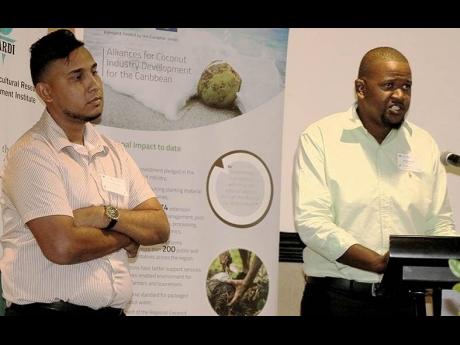Guyana farmers share lessons on improving coconut industry
AS THE five-day regional coconut workshop, ‘Sustainable and Resilient Coconut Production within a Changing Climate’, came to a close yesterday, the testimony shared by Guyanese participants revealed a glimpse into how the cultivation of coconut rose from obscurity to a priority in their country.
Eusi Simpson, the Caribbean Agricultural Research Development Institute (CARDI) Guyana coconut technician explained that the nation had an ailing coconut industry prior to the introduction of the Alliances for Coconut Industry Development, Expansion, and Enhanced Support for the Caribbean (ACIDES) project, during a technical session held at The Jamaica Pegasus hotel in New Kingston.
The project, which is funded by the European Union (EU), is nearing the conclusion of its second phase, which started in 2019. The first phase of the project started in 2014.
“Most of our coconuts, let me say, about 50 per cent of the coconut in the country were senile, around 50 years plus,” he said.
The main obstacle was that a lot of people simply did not realise how much of a profitable venture coconut cultivation could be.
“A farmer would say ‘why plant coconut and wait three to four years for bearing? That was like too long.’ There wasn’t any sensitisation about nurturing a coconut plant, pest and disease management and all the agronomic practices,” Simpson said.
He added that the sentiment of many Guyaneses was that coconut trees were only bought to be planted in their backyards.
But with the introduction of the ACIDES project, which he described to be the “light at the end of the tunnel”, everything turned around.
Each phase of the ACIDES initiative lasts four years and supports 12 countries in the region.
Phase two’s overarching goal was to improve small-scale farmers’ competitiveness in the coconut value chains by achieving more sustainable production and commercialisation performance, as well as improved integration with local, regional, and international markets.
The project is also supported by the Caribbean Forum (CARIFORUM) Secretariat and implemented by the International Trade Centre, CARDI, the Coconut Industry Board (CIB), key government agencies and business groups in Jamaica.
TRAINING SESSIONS
“CARDI Guyana in collaboration with the National Agriculture Research and Extension Institute (NAREI), Hope Coconut Industries Limited (HCIL) and the Ministry of Agriculture in Guyana started a number of sensitisation [and] training sessions, travelling around the country, teaching farmers [and] training farmers in intercropping ... agronomy, pest and disease management, mother palm selection and so forth,” he explained.
According to Simpson, the industry has undergone such significant change that coconut is currently the third-most important crop in the nation – coming after rice and sugar.
He continued that the number of coconuts produced rose above the 15,000 of those that were cultivated.
Simpson went on to say that there had been an increase in the number of coconut farmers from the initial 1,500 to the current 2,100 people engaged in the process.
Furthermore, connections have been established with coconut exporters, farmers, and processors nationwide.
Given the increased interest in the sector, a new high-quality hybrid variety of coconut was released into the market, something that had not been done in the previous 40 years, he added.
The first batch of 1,000 Brazilian Green Dwarfs were issued in December 2022.
Ravindra Singh, field extension officer at HCIL, stated that the role of the government agency was to provide farmers with high-quality coconut seedlings at a subsidised price.
Farmers show limited interest in the Panama Tall and Jamaican Tall variants; the varieties which are higher in demand are the green, yellow, and orange Malayan Dwarf.
“Initially, we only had the capacity at Hope Coconut Industries, to produce 1,500 seedlings yearly. But, with help from CARDI, the government of Guyana and the IDB (Inter-American Development Bank), today we have 10 nurseries across the country which has the capacity to produce 206,000 seedlings annually,” he revealed.

